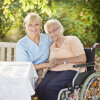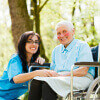Approximately 48 million people throughout the United States experience a foodborne illness or infection each year. Of these, around 128,000 will require hospitalization, and 3,000 will die as a result of their illness or infection.
As a family caregiver, it is extremely important to recognize that elderly adults are more vulnerable to foodborne illness and infection, also referred to as food poisoning, than younger adults, and are more likely to experience severe consequences as a result of such illnesses and infections. Being able to detect the potential signs and symptoms of such an infection can allow you to act quickly, get your senior the medical care they need, and help them through healing and recovery.
Some of the signs and symptoms of foodborne infection include:
- Nausea
- Vomiting
- Stomach cramp
- Feeling sick to your stomach
- Fever
- Chills
- Diarrhea
These symptoms can occur within a relatively short period of time of consuming contaminated food, but can also appear days after. While most of the time these illnesses or infections are mild and will resolve themselves, they can quickly become severe.
Contact your senior’s doctor if they experience any of the following symptoms related to a foodborne infection or illness:
- A temperature of over 101.5
- Blood in the stool
- Frequent vomiting that prevents your senior from being able to keep fluids down effectively
- Diarrhea that is persistent for more than 3 days
- Signs of dehydration such as dizziness upon standing, a decrease in urination, and dryness of the mouth and throat
Depending on the virus, bacteria, or pathogen that has led to the illness or infection, the symptoms can occur anywhere between 30 minutes and a month after consumption of the contaminated food. If your parent begins experiencing these symptoms, and you cannot relate them to another illness, think back through what your parent has eaten in the preceding several days. If they have eaten at a restaurant recently, it is important to contact that restaurant after your parent’s diagnosis to inform them for reporting purposes.
Getting proper nutrition is one of the most important elements of your senior maintaining health as they age in place. Elderly care can be extremely beneficial when it comes to helping your senior get the nutrition they need on a regular basis.
An elderly home care services provider can provide safe and reliable transportation to the grocery store to stock their home with healthy options, provide reminders of dietary restrictions and instructions from their doctor, assist with meal and snack preparation, and encourage your senior to get enough hydration on a regular basis. This can not only help your parent to maintain better health, but also to support mental and emotional well-being, and quality of life.











